Filter by
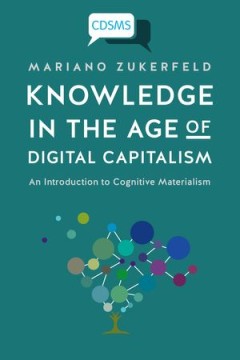
Knowledge in The Age of Digital Capitalism An introduction To Cognitive Mate…
Knowledge in the Age of Digital Capitalism proposes a new critical theory concerning the functioning of capitalism and how we consider knowledge and information. This ambitious book systematically and lucidly introduces contemporary phenomena into the framework of cognitive materialism to address some of the great themes of the social sciences: knowledge, exploitation and social class in an acc…
- Edition
- -
- ISBN/ISSN
- 9781911534242
- Collation
- -
- Series Title
- -
- Call Number
- -
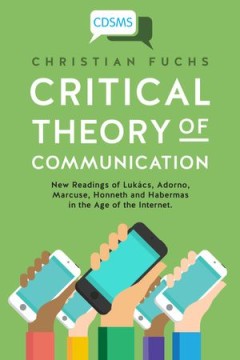
Critical Theory of Communication New Readings of Lukács, Adorno, Marcuse, H…
"This book contributes to the foundations of a critical theory of communication as shaped by the forces of digital capitalism. One of the world's leading theorists of digital media Professor Christian Fuchs explores how the thought of some of the Frankfurt School’s key thinkers can be deployed for critically understanding media in the age of the Internet. Five essays that form the heart of th…
- Edition
- -
- ISBN/ISSN
- 9781911534044
- Collation
- -
- Series Title
- -
- Call Number
- -
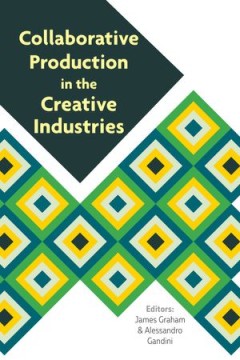
Collaborative Production in the Creative Industries
In recent years research into creative labour and cultural work has usually addressed the politics of production in these fields, but the sociotechnical and aesthetic dimensions of collaborative creative work have been somewhat overlooked. This book aims to address this gap. Through case studies that range from TV showrunning to independent publishing, from the film industry to social media pla…
- Edition
- -
- ISBN/ISSN
- 9781911534280
- Collation
- -
- Series Title
- -
- Call Number
- -
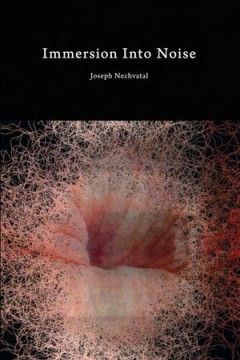
Immersion Into Noise
Joseph Nechvatal's Immersion Into Noise investigates multiple aspects of cultural noise by applying our audio understanding of noise to the visual, architectual and cognative domains. The author takes the reader through phenomenal aspects of the art of noise into algorithmic and network contexts, beginning in the Abside of the Grotte de Lascaux
- Edition
- -
- ISBN/ISSN
- 9781607852414
- Collation
- -
- Series Title
- -
- Call Number
- -

Political Discourses at the Extremes
"The authors of this edited volume focus on the emergence of populist discourses, coming from movements or parties from Romance-speaking countries in Europe and in Latin America. By combining linguistics, social and political sciences in a discourse analytical approach, the sixteen papers enlighten the mechanisms behind populist discourses yielding from different socio-cultural and political co…
- Edition
- -
- ISBN/ISSN
- 9789176350928
- Collation
- -
- Series Title
- -
- Call Number
- -

Violent Exceptions: Children’s Human Rights and Humanitarian Rhetorics
Violent Exceptions turns to the humanitarian figure of the child-in-peril in twenty-first-century political discourse to better understand how this figure is appropriated by political constituencies for purposes rarely to do with the needs of children at risk. Wendy S. Hesford shows how the figure of the child-in-peril is predicated on racial division, which, she argues, is central to both cons…
- Edition
- -
- ISBN/ISSN
- 9780814281178
- Collation
- -
- Series Title
- -
- Call Number
- 341.4 HES v
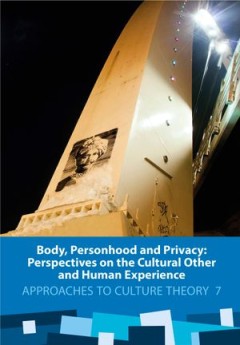
Body, Personhood and Privacy Perspectives On The Cultural Other and Human Ex…
This book studies how the concepts of body, personhood and privacy can be expanded across disciplinary borders. Notwithstanding the diversity of empirical material and theoretical frameworks, the chapters suggest innovative tools for common key issues: dialogue with the cultural Other, the appropriation of space, and personality. Human embodiment and ethical aspects of representing and regulati…
- Edition
- -
- ISBN/ISSN
- 9789949774593
- Collation
- -
- Series Title
- -
- Call Number
- -
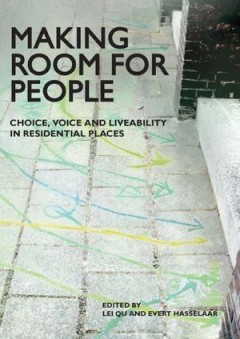
Making Room for People
Making Room for People elaborates on preferences in housing. It explores how users, occupants, and citizens can express their needs, searching for the enhancement of individual choice and control over their residential environment, and the predicted positive spin-off’s for urban collectives. The central question is: What are the conditions under which an increase of people’s choice and voic…
- Edition
- -
- ISBN/ISSN
- 9789085940326
- Collation
- -
- Series Title
- -
- Call Number
- -

Deviant Women Cultural, Linguistic and Literary Approaches to Narratives of …
This multidisciplinary collection of articles illuminates the ways in which the concept of female deviance is represented, appropriated, re-inscribed and refigured in a wide range of texts across time, cultures and genres. Such a choice of variety shows that representations of deviance accommodate meaning-making spaces and possibilities for resistance in different socio-cultural and literary co…
- Edition
- -
- ISBN/ISSN
- 9783653033199
- Collation
- -
- Series Title
- -
- Call Number
- -
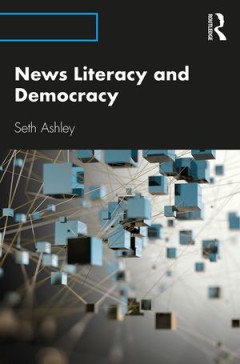
News Literacy and Democracy
News Literacy and Democracy invites readers to go beyond surface-level fact checking and to examine the structures, institutions, practices, and routines that comprise news media systems.This introductory text underscores the importance of news literacy to democratic life and advances an argument that critical contexts regarding news media structures and institutions should be central to news l…
- Edition
- -
- ISBN/ISSN
- 9781138625051
- Collation
- -
- Series Title
- -
- Call Number
- -
 Computer Science, Information & General Works
Computer Science, Information & General Works  Philosophy & Psychology
Philosophy & Psychology  Religion
Religion  Social Sciences
Social Sciences  Language
Language  Pure Science
Pure Science  Applied Sciences
Applied Sciences  Art & Recreation
Art & Recreation  Literature
Literature  History & Geography
History & Geography